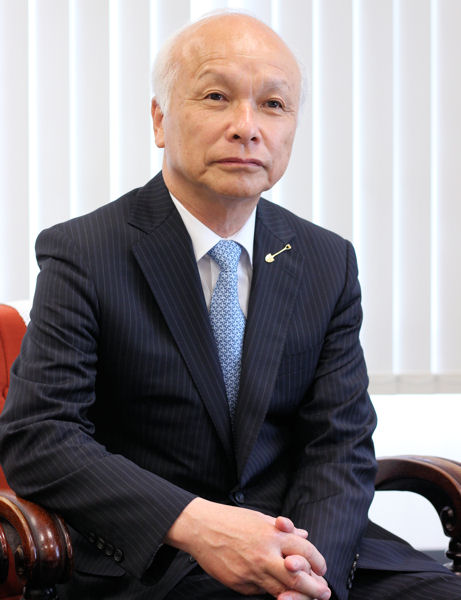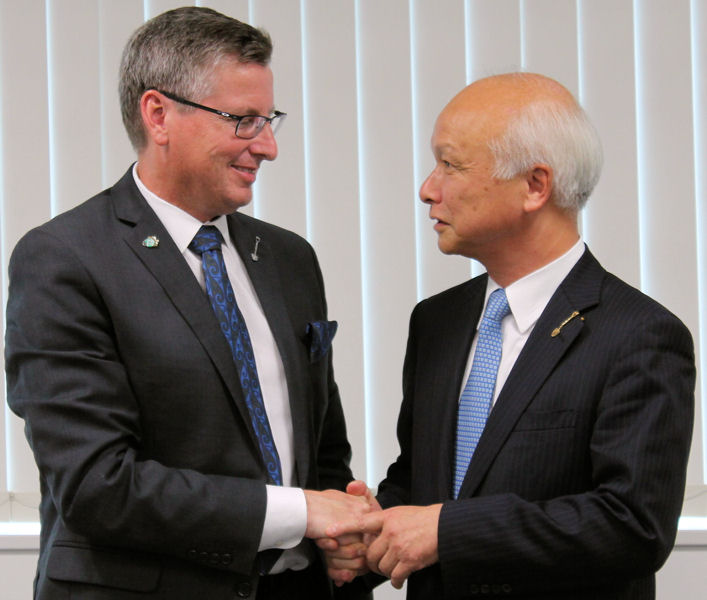
From left, Rick Warner, WEF President 2016–2017, presents Hisataka Sokawa, influential Japanese water sector leader, with a certificate recognizing Sokawa’s influence on the global water environment. Photo courtesy of the Japan Sewage Works Association.
Since 1971, Hisataka Sokawa has helped expand sustainable wastewater treatment services throughout Japan as well as increase awareness of global water challenges around the world. In May, the Water Environment Federation (WEF; Alexandria, Va.) helped celebrate the retirement of this 45-plus-year veteran of the water sector.
In the late 1960s, Japan suffered from severe levels of pollution and needed legislation and investment to support clean water services. During his career, Sokawa attempted to fill this need by working for the nation’s Ministry of Construction, the Japan Sewage Works Agency (Tokyo), and the Japan Sewage Works Association (JSWA; Tokyo).
Sokawa, a WEF member since 2012, started his career at the Ministry of Construction in 1971. He worked his way up to become the director-general of the ministry. During his tenure, he helped to develop new, national-level laws and funding programs to expand controls for wastewater and industrial discharge, combined sewer overflows, and flood prevention. Through his dedication, leadership, and foresight, Japan’s service accessibility rates grew from 16% in 1971 to 78% in 2016.
In 1995, an earthquake in Kobe, Japan, caused widespread damage to the country’s wastewater infrastructure. Sokawa’s oversight of the recovery efforts led to the creation of a national emergency response and recovery system. This system gathers resources from wastewater utilities, the private sector, and the national government to respond collaboratively to problems caused by catastrophic earthquakes. Sokawa’s leadership in the aftermath of this disaster enabled smooth implementation of recovery work for subsequent events.

In addition to expanding wastewater treatment services throughout Japan, Sokawa has led efforts to increase collaboration between the Water Environment Federation (Alexandria, Va.) and the Japan Sewage Works Association. Photo courtesy of the Japan Sewage Works Association.
Sokawa left his position as director-general of the Ministry of Construction to join the Japan Sewage Works Agency. As director-general for utilities, he managed capital projects for utilities and led the agency’s efforts to expand wastewater services, especially in rural areas of the country, through 2011. In 2012, Sokawa joined JSWA as director-general and worked to revitalize the organization’s international activities, which included strengthening the organization’s relationship with WEF.
Under Sokawa’s leadership, WEF and JSWA have experienced a close collaboration. In 2015, Sokawa led a delegation of 15 Japanese professionals to Water and Energy 2015: Opportunities for Energy and Resource Recovery in a Changing World. The joint conference, organized by WEF, JSWA, and the European Water Association (Hennef, Germany), was held in Washington, D.C., to increase awareness of global water challenges. Sokawa encouraged Japanese academics as well as private and public-sector professionals to participate by sharing their experiences and case studies.
Sokawa also encouraged and helped prepare Japanese water sector professionals to become presenters at the annual WEF technical exhibition and conference (WEFTEC®). These professionals took this opportunity to discuss important Japanese projects and programs as well as exchange meaningful technical information with attendees from a variety of countries, agencies, and backgrounds. Many rich discussions at WEFTEC have resulted directly from collaboration fostered by Sokawa.

Warner congratulates Sokawa on his retirement. Photo courtesy of the Japan Sewage Works Association.
To further strengthen relations between WEF and JSWA, Sokawa invited then WEF President Ed McCormick in 2015 and current WEF President Rick Warner in 2017 to Japan to give JSWA members the opportunity to hear from U.S. water sector experts. He also directed JSWA to hold its 2017 annual technical conference in English for the first time in its more than 50-year history. This directive will give WEF and other international professionals the opportunity to learn from their Japanese colleagues.
During his visit to Japan, Warner presented Sokawa with special recognition from the WEF Board of Trustees that acknowledged his positive influence on the global water environment and congratulated him on his retirement.
— Laila Sukkariyyah, WEF Highlights








July 26, 2017
Featured